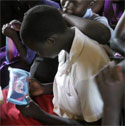 |
 |
 |
Project - AfriPads |
 |
|
AfriPads - Malawi
www.afripadsfoundation.org
After the of the distribution was made read the report and see the photos of how the girls did.
 A few years back I met with Miki Agrawal who was starting up her THINX company, to change the paradigm around menstration and maintenance. She has in the interim successfully launched the brand. Recently on the subway I noticed lots of their advertising and looked into the company again. Through their site I happened upon AfriPads which is a similar idea, locally sustained, to provide reuseable materials for menstral pads. This for-profit company, which is doing good by doing well, was linked to a not-for-profit arm which takes this product and makes it available to those who can not afford to buy or do not have the access to it.
A few years back I met with Miki Agrawal who was starting up her THINX company, to change the paradigm around menstration and maintenance. She has in the interim successfully launched the brand. Recently on the subway I noticed lots of their advertising and looked into the company again. Through their site I happened upon AfriPads which is a similar idea, locally sustained, to provide reuseable materials for menstral pads. This for-profit company, which is doing good by doing well, was linked to a not-for-profit arm which takes this product and makes it available to those who can not afford to buy or do not have the access to it.
AFRIpads Ltd., a Ugandan company manufacturing washable sanitary pads, was founded in 2010 to offer access to affordable sanitary pads to Ugandan school girls. Lack of sanitary pads is the main reason for girls in developing countries to drop out of school, because it causes them to miss 5 days of school per month on average. AFRIpads are locally made, providing employment to 150 women currently, environmentally friendly and a low-cost alternative to disposable pads, because AFRIpads can be used for one year instead of being thrown away immediately after use. The AFRIpads Foundation was founded in 2010 as well, to distribute AFRIpads kits to the most underprivileged girls in remote areas, who can't even afford to buy AFRIpads.
 By providing girls with AFRIpads kits, accompanied by education about feminine and menstrual hygiene, girls can not only remain in school but become more in control of their bodies and thereby their destiny. AFRIpads kits are bought from the company in Uganda or Malawi at $5,-- per kit, allowing a girl to stay in school, even when she has her period, for a full year.
By providing girls with AFRIpads kits, accompanied by education about feminine and menstrual hygiene, girls can not only remain in school but become more in control of their bodies and thereby their destiny. AFRIpads kits are bought from the company in Uganda or Malawi at $5,-- per kit, allowing a girl to stay in school, even when she has her period, for a full year.
The AFRIpads company carries out the donations and provides the education materials and teachers to accompany the donations, and is responsible for reporting. Our target group is school girls in remote areas who are unable to afford to buy AFRIpads kits themselves, usually between 9 and 16 years old. Absenteeism is mainly caused by menstruation issues (affordable sanitary pads and painkillers are not available for many of these girls), illness and lack of money to pay school. In rural areas almost all the girls use cotton cloths when they have their monthly periods. Only a small minority is able to buy disposable pads occasionally.
 Especially in rural areas in Malawi, the situation of girls and women is distressing - they have little opportunities for paid work and often do not finish secondary school or learn a trade skill. In prior distributions it was found that yhe majority of the girls feel content with the product because it is comfortable in use and it does not leak. Furthermore they save money and miss less schooldays. This last conclusion was also confirmed by the teachers. For 2017 the district Balaka was selected in conjunction with the Education Manager Division South East, where the is plan to distribute at 5 secondary schools:
Balaka Secondary School (143 girls), Toleza CDSS(102), Dziwe CDSS (290), Namalomba CDSS(205), ST Louis Montfort CDSS(300) for a total of 1040 girls. Forix will fund this initiative.
Especially in rural areas in Malawi, the situation of girls and women is distressing - they have little opportunities for paid work and often do not finish secondary school or learn a trade skill. In prior distributions it was found that yhe majority of the girls feel content with the product because it is comfortable in use and it does not leak. Furthermore they save money and miss less schooldays. This last conclusion was also confirmed by the teachers. For 2017 the district Balaka was selected in conjunction with the Education Manager Division South East, where the is plan to distribute at 5 secondary schools:
Balaka Secondary School (143 girls), Toleza CDSS(102), Dziwe CDSS (290), Namalomba CDSS(205), ST Louis Montfort CDSS(300) for a total of 1040 girls. Forix will fund this initiative.
|
|
|